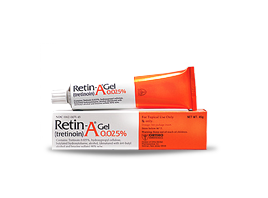we accept  Retin-a Gel 0.1
Retin-a Gel 0.1

Tretinoin is a powerful medication which treats acne. Its components are extracted from vitamin A. It treats moderate acne and is especially effective for patients with acne.Those who used this cream admit its positive effect on inflammations of the skin and for many, it is an excellent choice of cure.Retin-A lowers the number of dark spots, in addition, it eliminates wrinkles and is often used in cosmetics as an agent against signs of aging.
- Availability: In Stock (42 packs)
- Active Ingredient: tretinoin
- Analogs of Retin-a Gel 0.1
- Retino A Cream 0.025,
- Accutane,
- Retino A Cream 0.05
| Package | Per Pill | Savings | Per Pack | Order |
|---|---|---|---|---|
| 3 tubes | $61.36 | |||
| 10 tubes | $14.89 | $55.59 | $204.53 $148.94 | |
| 15 tubes | $14.10 | $95.30 | $306.80 $211.50 | |
| 20 tubes | $13.70 | $135.02 | $409.07 $274.05 |
Retin-a Gel 0.1 (Tretinoin)
Teen acne is, probably, the issue the majority of people have to deal with at a certain age. Unfortunately, some individuals face this problem at an already mature age. In such cases, the probability that the pimples will disappear on their own is close to zero. Hence, to manage acne one needs to undergo a serious and lasting treatment. Retin-A gel 0.1% is one of the most effective remedies applied in acne therapy.
Product description
The active ingredient of Retin-A gel is Tretinoin. It belongs to the group of retinoid drugs and influences the way the skin cells grow. Application of the gel to the areas affected by acne leads to a faster maturation of a pimple and its quick healing. That’s why at the initial stages of treatment the illness gets worse. Yet in two or three months (depending on the severity of the skin condition) the patients start noticing a significant improvement of the skin health.
The preparation is applied once a day usually before bedtime. The skin should be clean and dry. You may ask your healthcare provider about the most effective ways of cleaning the area where Retin-A gel will be applied.
The layer of gel should be thin. Using more medicine than it is needed won’t do any better for the skin but will increase the risks of experiencing side effects.
Safety information
You shouldn’t use Retin-A gel 0.1% without the doctor’s recommendation. Only a specialist may determine whether the medicine may safely be used in your particular case and compare all the possible risks and the benefits you may get.
To the people, who should avoid using Retin-A gel 0.1% belong:
- Pregnant and breastfeeding women. Retinoids may have a negative impact on the process of the fetus development and the health of a nursing baby.
- Women, who plan to get pregnant. The therapy with Retin-A gel 0.1% should be discontinued about four weeks prior to the planned pregnancy. To exclude the probability of getting pregnant when on Retin-A gel, use some reliable birth control method.
- Individuals with untreated skin diseases (e.g. eczema). The therapy of acne should be started only after the disease will be cured.
- People with irritated, sunburned, cut or injured skin.
- Patients with an allergy to the active or any inactive components of the remedy.
During the treatment the patients have to follow a number of rules:
- Stay away from the direct sun rays as your skin becomes several times more predisposed to the sunburn when on Retin-A gel;
- Use the sunscreen, sunglasses, and hats to protect the skin from UV-rays;
- Take into account that other weather conditions may also have a negative impact on your skin;
- Don’t remove the hair from the affected area with the help of wax or chemical depilatories.
In addition, you should tell your medical specialist about the drugs, herbal products, vitamins and supplements you administer to avoid dangerous drug interactions.
Side effects
The gel use may result in:
- Irritation and itching;
- Swelling or reddening of the skin;
- Very dry skin;
- Appearance of crusts and blisters;
- Light or severe burning of the skin;
- Acute reactions of hypersensitivity to the medication shown through swelling of the face, throat or tongue, which prevents normal breathing.
Almost all local side effects disappear later during the treatment, yet in case of experiencing any severe side effects or if they are bothering, turn for medical help. Perhaps you need a lower dose of the medicine.
